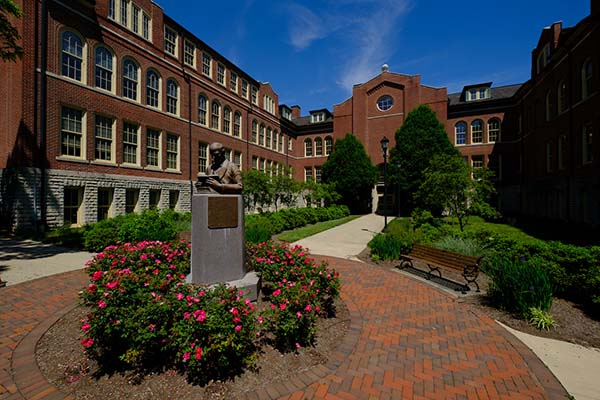Multi-Disciplinary Collaborations Help to Advance Miami’s Research Success
Interdisciplinary collaborations and consistent efforts have generated record levels of funding for EHS

Multi-Disciplinary Collaborations Help to Advance Miami’s Research Success
Collaborative efforts between the Discovery Center and various faculty across Miami University have led to a record year of grant funding for the College of Education, Health, and Society (EHS).
In the calendar year 2020, EHS secured over $8M in awards after 41 grant proposals were submitted. Of these proposals, more than half (54%) were funded.
Similarly, in 2021 EHS submitted 42 proposals totaling over $11M. Of these proposals, so far almost half (40%) have been funded, while a large number of remaining proposals are still in consideration by funders.
Collaborations are key
This success over the past two years signals the remarkable efforts of multiple faculty, campus divisions and departments, and interdisciplinary partnerships that have focused years of work and dedication toward achieving their goals. Since 2017, these types of collaborations have become more prominent.
“This is evidence that a lot of people in EHS are working across disciplines and we're seeing more productive collaborations,” said Sarah Woodruff, Discovery Center director. “When we look at funded proposals, especially the larger ones, most are not single investigator projects. Those in higher ranges are very much about groups of individuals that plan together, and have built relationships for years. When those are developed the results are really great.”
Among these key EHS collaborators is the Discovery Center itself.
As an institution that provides comprehensive research, evaluation, and assessment services, Discovery Center often works closely with EHS, as well as with additional faculty across Miami’s campus and with external entities such as other universities, school districts, and community organizations across the country.
Between 2019 and 2021, nearly 80% of all EHS funded proposals marked a collaboration with Discovery. In fact, in 2019 alone, every funded EHS proposal (100%) received some level of support from the Discovery Center.
“We have faculty who have been very intentional about expanding interdisciplinary collaborations across the university, and we’ve been very intentional in better leveraging our existing research infrastructure, such as the Discovery Center, to create a more systemic approach to supporting grant development,” said EHS Dean Jason Lane. “These efforts enhance our competitiveness when funders look to make smart investments in the future of society.”
A team effort
Alongside collaborations with Discovery, EHS can also point to the cumulative effect of dozens of smaller awards that contributed to its overall success.
“There are many awards between 100k and 200k, which may not seem like much, alongside a million dollar award,” Woodruff said. “But those are really the bread and butter of EHS. If you compare education to other fields like engineering, the same kinds of funds are not available. So these awards really are the building blocks for larger ones.”
Some of these recent awards include:
- Miami University Robert Noyce Scholars Program (314K), led by Nazan Bautista, Tammy Schwartz, and Jeff Wanko (EHS) with Ellen Yezierski, professor of Chemistry, and Jennifer Blue, professor of Physics.
- Enhancing and Expanding Partnership Models for Collaborative Recruitment and Retention of BIPOC Intervention Specialists (149K), led by Jason Abbitt and Sarah Watt (EHS)
- Youth and YoungAdult Early Intervention Initiative (375K), led by Cricket Meehan, director of the Center for School-based Mental Health programs in the department of Psychologyand Sarah Woodruff (EHS)
- Evaluation of the School Climate Transformation Grant (285K), led by Anthony James and Sarah Woodruff (EHS)
- Miami Inclusive Licensure Partnership (74K), led by Leah Wasburn-Moses, Ashley Johnson, Kim Wachenheim, Molly Kelly, Sarah Watt, and Sheri Leafgren (EHS)
Success takes time
Even the largest grants from 2020 and 2021 were the result of established interdisciplinary relationships, consistent collaborations, or ongoing efforts and resubmissions that slowly built toward more substantial success over time.
The $6M secured by the Ohio School Wellness Initiative (OSWI) in 2020, for example, was the direct result of deep interdisciplinary work between Cricket Meehan, director of Miami’s Center for School-Based Mental Health Programs in the department of Psychology, several EHS Educational Psychology and Social Work faculty, and the Discovery Center, as well as years of collective reputation-building expertise on all sides.
Similarly, the $2.5M awarded to the ¡PELEA! Fight! program in 2021 was preceded by years of incremental steps and several resubmissions on behalf of Martha Castañeda and her team.
“Martha first applied for funding for this project in 2017, and it finally paid off in 2021,” Woodruff said. “But she had been laying the groundwork for this proposal for years. There was a lot of work and a lot of networking and collaborating along the way. That’s key. That's what we're seeing with proposals that are funded for higher amounts.”
Of course, even more important than the awards themselves are the innovative projects and important advancements they will make possible going forward.
“The significant increase in research funding in EHS is a testament to the strength of our faculty, the importance of collaboration, and the relevance of the real-world problems we are seeking to address,” Lane said.